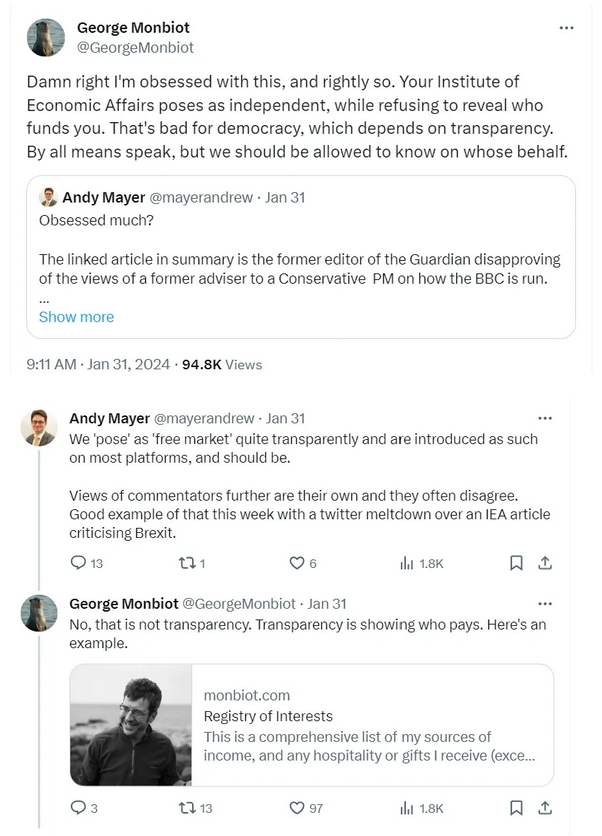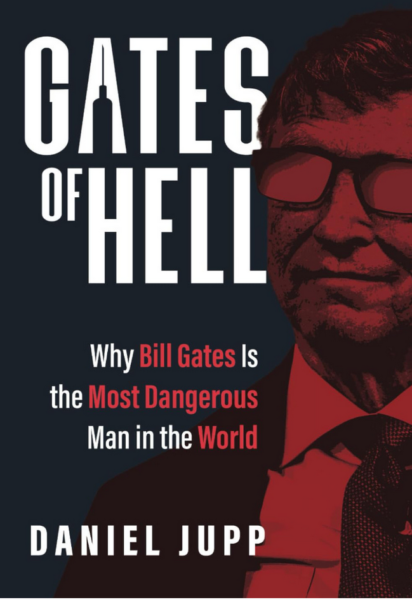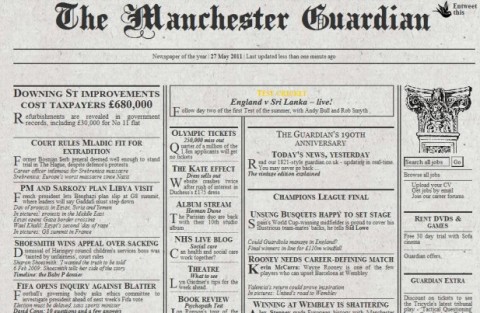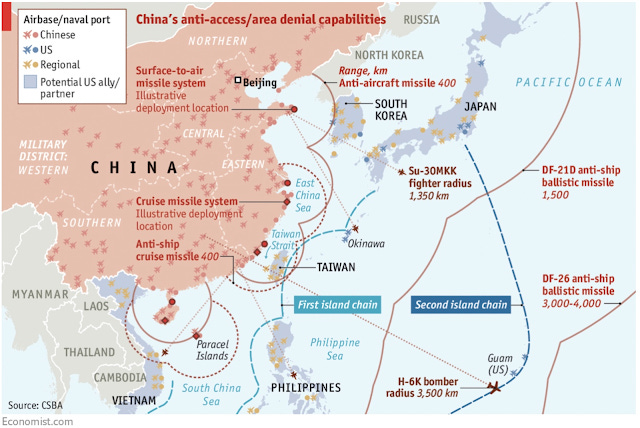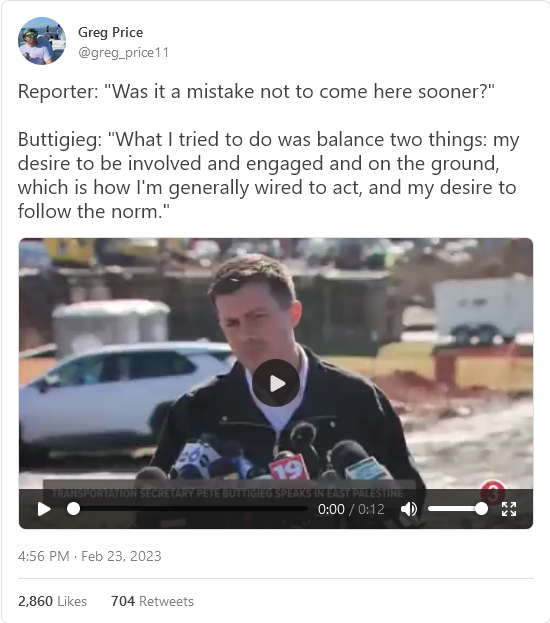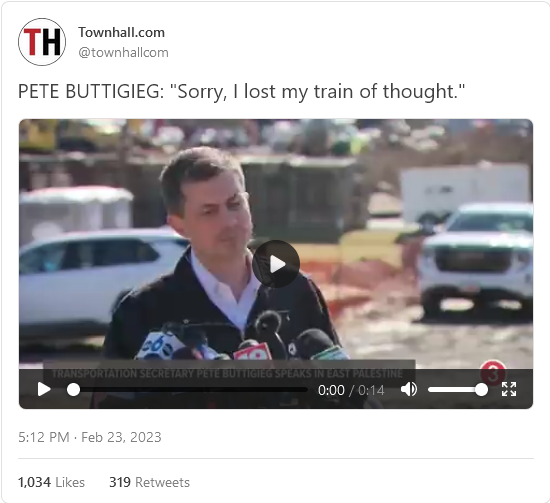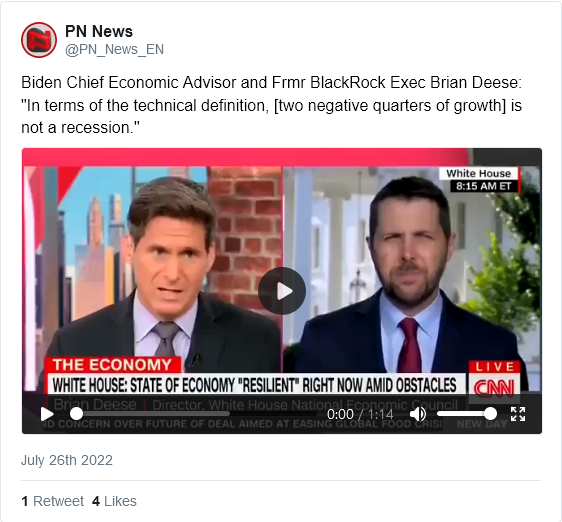World War Two
Published 23 Nov 2024After the fall of the Third Reich, many of Hitler’s generals are convicted as war criminals by the Allies and condemned to prison and disgrace. Yet, within a few years, the Western Powers embrace them Cold War partners against the Soviet Union. In this new alliance, they rewrite history and create the enduring myth of the “clean Wehrmacht“.
(more…)
November 24, 2024
How Allied and Nazi Generals Created the Clean Wehrmacht Myth
June 19, 2024
QotD: Canada’s Liberal Party
I keep replaying Scott Reid’s comment in my mind […] “Paul Martin is the wire brush that will scrub clean this stain on Canadian politics.”
Honestly, now, if you moved this metaphor any closer to the bathroom, there’d be no room for anybody to sit down. What have we come to when the communications director for the prime minister of Canada comes within an ace of referring to his own party as a filthy toilet in need of some elbow grease?
Colby Cosh, ColbyCosh.com, 2005-04-09.
May 31, 2024
The best that can be said about VIA Rail is that its financials aren’t as dire as Canada Post
Chris Selley outlines the financial black holes that are the two Crown Corporations — Canada Post and VIA Rail Canada:

VIA Rail 918, a General Electric model P42DC locomotive, at Belleville, Ontario on 23 December 2008.
Photo by Martin Cathrae via Wikimedia Commons.
If you’re unfamiliar with Via’s financials, I’ll advise you to sit down now.
In 2023, the average passenger on The Canadian line [Toronto/Montreal to Vancouver] was subsidized by the taxpayer to the tune of $1,014.77. Revenues on the route were less than half of expenses. And your average Canadian can’t even hope to ride the bastard thing: A bunk bed for the 34 hours and 35 minutes it takes to get from Toronto to Winnipeg still goes for the bargain price of $895.
It’s a cruise ship. Not only are we lavishly subsidizing a cruise ship, but we own the cruise line, and we’re buying it new ships. It’s absolutely bananas. And among those applauding the expenditure is, somehow, the NDP’s transport critic Taylor Bachrach. Where’s simplistic populism when you need it? No money for cruise ships!
Meanwhile, media are being far too indulgent of Via’s alarming and increasing vagueness as to whether it’s committed to “high-frequency rail” on the Toronto-to-Quebec City corridor, or to “high-speed rail”, or to some combination of both. This could not be a bigger or brighter red flag: Beware of Oncoming Boondoggle.
Committing billions of dollars to a new rail corridor between Toronto and Quebec City without a firm idea as to whether it’s “high-frequency” or “high-speed” is a bit like committing billions to a new housing development without knowing whether it’s bungalows or high-rise condos. A train going 300 kilometres per hour, or more (i.e., high-speed rail) needs vastly more protection (fences, eliminating level crossings) than a train going 200 kilometres per hour. It’s not a minor detail or something to be worked out later.
And it’s painfully obvious why Via’s executives are sowing the confusion: Because the high-frequency rail plan that they actually have simply isn’t that compelling. It may offer no time savings at all between Montreal and Toronto — and anyone who tries to tell you a five-hour trip between Montreal and Toronto is a compelling option for business people is either a deluded railfan or works for Via.
“Canada charts path for high-speed trains, but obstacles loom,” a recent Globe and Mail headline declared, completely incorrectly. But casual news consumers can absolutely be forgiven for thinking Via’s working on a Toronto-to-Quebec City version of France’s TGV. Should the high-frequency rail plan ever get built, I can only imagine the kvetching and disappointment that would follow.
May 1, 2024
February 8, 2024
February 2, 2024
“Who funds you?”
Tim Worstall considers George Monbiot (lovingly known as “The Moonbat” to early bloggers) and his demand that others make their sources of income transparent to show whether their opinions are being “bought” by shady interested parties:
George Monbiot has his positive attributes. His change of mind on nuclear power in the face of the evidence from Fukushima — that no one at all died from three reactors going pop, while 15k and more did from the tsunami and therefore he became in favour of nuclear — is an example. OK, that’s rather hitting someone over the head with a cluebat but it’s also true that Caroline Lucas didn’t manage to note that same point. So, there is that. Even if “more aware of reality that Caroline Lucas” is a low bar to have to clear.
George can also rather dig himself into holes. As he is here with his insistence about funding of varied think tanks and so on.
And, OK, let’s go look at George’s registry of interests […]
OK, that’s the sword that George declares he’s going to live by. Fair play and all that.
Except, except. Last year was pretty good, book royalties flowing in and more power to that typing. The core earning is The Guardian, royalties on top. Not unusual for a writer to be honest. Gain a core contract that produces an ongoing and assured income, spend time floating books or other work out there to see what happens to income. Freelancing is certainly a great deal more fun if you already know where the monthly nut is going to come from with such a core contract.
But, but.
Book royalties, umm, Penguin? Used to be part owned by Pearson, also at the time owners of the Financial Times. So that’s a connection into the shadowy world of international capitalists. It’s now Bertelsman, so foreign international capitalists to boot. Macmillan? They admitted to bribery in Sudan over a school books contract. So a link to international thieving capitalists too. HarperCollins? That’s Murdoch, no more need be said, right?
But, but, a reasonable response would be that this is all far removed from the level George works at. That would be a fair enough response too.
But note the thing here. By agreeing that there’s some level of connection which is too ephemeral to matter we are agreeing that this thing called the corporate veil exists. We can indeed don the tin foil hats and connect near anything we want. Pretty much all Europeans are 16th cousins for example. So I — and George — am/are responsible for WWI because we’re both related to the Kaiser, Emperor and Tsar all at the same time. It’s our family wot dun it, see? Within economic connections that concept, that there’s this thing ‘ere which is responsible not the further connections away from that, is called that corporate veil. I shop at Sainsbury’s sometimes. The Labour Minister husband of a Sainsbury’s heiress employed two butlers (before dumping her for his boyfriend if memory serves). It’s possible to claim that I therefore fund dual butlership but it’s not a claim that all that many are going to regard as valid.
But The Guardian, that core contract. The newspaper seems to have returned to profit recently but there was a decade or so there where it was losing tens of millions a year — and more in some 12 month periods. Those losses were covered by the profits from Autotrader more than anything else. So, George was funded by the facilitation of climate destruction through the trade in internal combustion engined cars.
If, you know, we wanted to put it that way.
December 8, 2023
“An error of this magnitude makes one wonder how robust such calculations are”
Christopher Snowden notes the proliferation of media and public advocacy groups warning us about “junk food”:
On Monday, the front page of The Times led with a speech from Henry Dimbleby and a cost-of-obesity estimate from the Tony Blair Institute for Global Change — the perfect start to the week for any Times reader. According to Sir Tony’s think tank, “the effect on national productivity from excess weight is nine times bigger than previously thought”. An error of this magnitude makes one wonder how robust such calculations are (the previous estimate only came out last year), but Mr Dimbleby saw it as further proof that food should be treated like smoking.
The NHS “will suck all the money out of the other public services” while “at the same time, economic growth and tax revenue will stagnate. We will end up both a sick and impoverished nation,” Dimbleby will warn.
Would it be unfair to point out that the USA has much higher rates of obesity than the UK and also has much higher GDP growth?
As I pointed out on what I shall continue to call Twitter, the estimates as bunkum. They come from Frontier Economics and were first commissioned by the makers of Wegovy, presumably to make their effective but expensive weight loss drug look like a relative bargain.
Their previous estimate of the cost of obesity to “society” was £58bn. This year’s estimate is £98bn, most of which (£57bn) comes from lost quality-adjusted life years. As I tire of pointing out, these are internal costs to the individual which, by definition, are not costs to wider society. I can’t stress enough how absurd it is to include lost productivity due to early death as a cost to the economy. You might as well calculate the lost productivity of people who have never been born and claim that contraception costs the economy billions of pounds.
Since the previous estimate, the costs have been bulked up by including the costs of being overweight, but there is no indication in the wafer-thin webpage of what these are. Being merely overweight doesn’t have many serious health implications. The healthcare costs have doubled, but as in the previous report, the new estimate does not look at how much more healthcare would be consumed if there was no obesity. No savings are included. What we need is the net cost.
The “report” that The Times turned into a front page news story is no more than a glorified blog post. It contains no detail, no methodology and none of the assumptions upon which it is based can be checked. It comes with an eight page slideshow from Frontier Economics which is described as a “full analysis” but which doesn’t contain any useful figures either.
Estimates like this are bound to mislead the casual reader into thinking that they are paying higher taxes because of obesity. There is no other reason to publish them, as they have no academic merit. They are designed to be misunderstood.
Sure enough, the very next day The Times was explicitly claiming that the putative £98 billion — now rounded up to £100 billion — was a direct cost to government …
The findings come after an analysis found this week that Britain’s weight problem is costing the state almost £100 billion a year.
November 12, 2023
The most dangerous man in the world?
Elizabeth Nickson on Daniel Jupp’s new biography of Bill Gates, Gates of Hell: Why Bill Gates is the Most Dangerous Man in the World:
A new book, Gates of Hell: Why Bill Gates Is the Most Dangerous Man in the World by Daniel Jupp, manages to dissect all of Gates’s activities since September 2011 and has he ever been a busy psychopath. Jupp is one of the several gifted polemicists called forth by the gnarly times we live in. He soared to recognition with witty, but somehow soothing Facebook blasts that combined PJ O’Rourke with Jonathan Swift with Steve Bannon. Everyone passed around his posts exulting. Jupp, if that is his real name, hails from working class England, Essex to be precise-ish, and edits or writes for Country Squire Magazine. Whatever, he is of the time and do we ever need him.
Jupp in Gates of Hell is careful. He does not risk libel, not even a whiff of it. And in contrast to his usual oxygen-rich posts, he is measured, calm, working with a surgeon’s focus, as he peels back the PR, the methodology, the results, the hiding of the malign results, the cantering on to the next heady task as the ultimate white Saviour. Unfortunately, as Jupp describes, Gates is not quite as simple as that. He also changes law, dictates policy in far too many countries where he does not belong, buys all the media, and every politician he can. When he calls, the Great and the Good come to sit in his Presence and be lectured to in that stickily sentimental tone about his noble purpose. When he makes a mistake, and almost everything he does is a mistake, he spends several hundred million dollars buying desperate legacy media and every functional PR firm to cover it up.
Gates’s life changed when his practice of turning competitors to scorched earth, thereby crippling innovation in the digital world, resulted in an embarrassing court case. The sullen, nit-picking slug on trial, radiating contempt is, I suspect, the real Gates, or his shadow self, very much like Gollum in LOTR defending his Precious. Jupp skates by the many charges of sexual abuse, but points out that he formally left Microsoft after one of them became too big to ignore.
Gates then constructed his new self. He married, not a babe, but a substantive character, and had three children in quick succession. He hired the most expensive fixers and PR, and built himself an avuncular sweater-clad persona. He was going to give away his massive fortune, give back to the people from his incredible privilege.
In the ensuing years, that fortune doubled and then doubled again.
That’s because he met Jeffrey Epstein. While Epstein’s sexual activities have received 90% of the attention, his activities during the last years of the Clinton administration are the more significant. First of all, Epstein was running an entrapment scheme for various covert agencies, which made his insinuation into government easy. At the same time, he taught high-level government officials, cabinet ministers, heads of agencies, and the great larcenous dame herself, Hillary Clinton, how to steal. It was a pincer movement. Having second thoughts? Here’s a video of your encounter with a fourteen year old.
I’ll make it super simple: he taught these people, and they weren’t all Democrats, how to stand up a policy meant to benefit the least advantaged, like for instance access to the housing ladder, and then profit off it. Since then every government initiative has carved out for its progenitor, a fortune. His first, of course, was Freddie Mac and Fannie Mae and James Johnson who ran these agencies into deep bankruptcy, collapsed the ’08 economy, nevertheless walked away with $100 million from a government job. Wall Street Journal reporter, Gretchen Morgenson’s Reckless Endangerment covers the waterfront here.
July 3, 2023
Nuclear power
One of the readers of Scott Alexander’s Astral Codex Ten has contributed a review of Safe Enough? A History of Nuclear Power and Accident Risk, by Thomas Wellock. This is one of perhaps a dozen or so anonymous reviews that Scott publishes every year with the readers voting for the best review and the names of the contributors withheld until after the voting is finished:
Let me put Wellock and Rasmussen aside for a moment, and try out a metaphor. The process of Probabilistic Risk Assessment is akin to asking a retailer to answer the question “What would happen if we let a flaming cat loose into your furniture store?”
If the retailer took the notion seriously, she might systematically examine each piece of furniture and engineer placement to minimize possible damage. She might search everyone entering the building for cats, and train the staff in emergency cat herding protocols. Perhaps every once in a while she would hold a drill, where a non-flaming cat was covered with ink and let loose in the store, so the furniture store staff could see what path it took, and how many minutes were required to fish it out from under the beds.
“This seems silly — I mean, what are the odds that someone would ignite a cat?”, you ask. Well, here is the story of the Brown’s Ferry Nuclear Plant fire, in March 1975, which occurred slightly more than a year after the Rasmussen Report was released, as later conveyed by the anti-nuclear group Friends of the Earth.
Just below the plant’s control room, two electricians were trying to seal air leaks in the cable spreading room, where the electrical cables that control the two reactors are separated and routed through different tunnels to the reactor buildings. They were using strips of spongy foam rubber to seal the leaks. They were also using candles to determine whether or not the leaks had been successfully plugged — by observing how the flame was affected by escaping air.
The electrical engineer put the candle too close to the foam rubber, and it burst into flame.
The fire, of course, began to spread out of control. Among the problems encountered during the thirty minutes between ignition and plant shutdown:
- The engineers spent 15 minutes trying to put the fire out themselves, rather than sound the alarm per protocol;
- When the engineers decided to call in the alarm, no one could remember the correct telephone number;
- Electricians had covered the CO2 fire suppression triggers with metal plates, blocking access; and
- Despite the fact that “control board indicating lights were randomly glowing brightly, dimming, and going out; numerous alarms occurring; and smoke coming from beneath panel 9-3, which is the control panel for the emergency core cooling system (ECCS)”, operators tried the equivalent of unplugging the control panel and rebooting it to see if that fixed things. For ten minutes.
This was exactly the sort of Rube Goldberg cascade predicted by Rasmussen’s team. Applied to nuclear power plants, the mathematics of Probabilistic Risk Assessment ultimately showed that “nuclear events” were much more likely to occur than previously believed. But accidents also started small, and with proper planning there were ample opportunities to interrupt the cascade. The computer model of the MIT engineers seemed, in principle, to be an excellent fit to reality.
As a reminder, there are over 20,000 parts in a utility-scale plant. The path to nuclear safety was, to the early nuclear bureaucracy, quite simple: Analyze, inspect, and model the relationship of every single one of them.
March 29, 2023
The Grauniad something something glass houses something something throwing stones
In UnHerd, Ashley Rindsberg recounts the details we know so far about the Guardian‘s embarassing historical project to find out about the newspaper’s links to the slave trade:
The Guardian prides itself on being one of the most Left-leaning and anti-racist news outlets in the English-speaking world. So imagine its embarrassment when, last month, a number of black podcast producers researching the paper’s historic ties to slavery abruptly resigned, alleging they had been victims of “institutional racism”, “editorial whiteness”, “microaggressions, colourism, bullying, passive-aggressive and obstructive management styles”. All of this might smack of progressive excess, but, in reality, it merely reflects an institution incuriously at odds with itself.
Questions about The Guardian‘s ties to slavery have been circulating since 2020, when, amid the media’s collective spasm of racial conscience following the murder of George Floyd, the Scott Trust announced it would launch an investigation into its history. “We in the UK need to begin a national debate on reparations for slavery, a crime which heralded the age of capitalism and provided the basis for racism that continues to endanger black life globally,” journalist Amandla Thomas-Johnson wrote in a June 2020 Guardian opinion piece about the toppling of a statue of 17th-century British slaver Edward Colston. A month later, the Scott Trust committed to determining whether the founder of the paper, John Edward Taylor, had profited from slavery. “We have seen no evidence that Taylor was a slave owner, nor involved in any direct way in the slave trade,” the chairman of the Scott Trust, Alex Graham, told Guardian staff by email at the time. “But were such evidence to exist, we would want to be open about it.” (Notably, Graham, in using the terms “slave owner” and “direct way”, set a very specific and very high bar for what would be considered information worthy of disclosure.)
The problem is that the results of the investigation, conducted by historian Sheryllynne Haggerty, an “expert in the history of the transatlantic slave trade”, have never been made public. When contacted with questions about what happened to the promised report, Haggerty referred all inquiries to The Guardian‘s PR, which has remained silent on the matter. (The Guardian was asked for comment and we were given the stock PR response The Guardian gave following the podcaster’s letter.) But what we do know is this: according to Guardian lore, a business tycoon named John Edward Taylor was inspired to agitate for change after witnessing the 1819 Peterloo Massacre, when over a dozen people were killed in Manchester by government forces as they protested for parliamentary representation. Two years later, Taylor, a young cotton merchant, with the backing of a group of local reformers known as the Little Circle, founded the paper.
“Since 1821 the mission of The Guardian has been to use clarity and imagination to build hope,” The Guardian‘s current editor, Katharine Viner, proudly proclaims on the “About us” page of the paper’s website. Part of this founding myth concerns one of the defining social and political issues of the day, slavery, which the Little Circle members, including Taylor, vigorously opposed as a moral affront. “The Guardian had always hated slavery,” Martin Kettle, an associate editor, wrote in a 2011 apologia on why during the Civil War the paper had vociferously condemned the North while equivocating on the South.
That may be true, but it also presents an incomplete picture. The Manchester Guardian, as the paper was then known, was founded by cotton merchants, including Taylor, who were able to pool the money needed to launch the paper by drawing on their respective fortunes. While none of these men, many of whom were Unitarian Christians, is likely to have engaged in slavery, they didn’t just benefit from but depended upon the global slave trade that provided virtually all of the cotton that filled their mills. As Sarah Parker Remond, an African American abolitionist, said upon visiting Manchester in 1859: “When I walk through the streets of Manchester and meet load after load of cotton, I think of those 80,000 cotton plantations on which was grown the $125 million worth of cotton which supply your market, and I remember that not one cent of that money ever reached the hands of the labourers.”
March 22, 2023
A 60 Minutes show on the US Navy that wasn’t a hit piece?
CDR Salamander is pleased at the way the CBS team for 60 Minutes presented their US Navy coverage in a recent show:
A regular topic of conversation here […] is the lack of discussion in the public space about the importance of a strong Navy to our republic’s economic and military security. Sure, inside our salons, slack channels, and email threads we talk to each other a lot, but we seem to have a hard time getting our message out to the general public.
Sunday night’s 60 Minutes was an exception to the rule. There is a lot of credit to go around here. First of all, you have to give credit to the 60 Minutes team fronted by Norah O’Donnell and lead producers Keith Sharman and Roxanne Feitel. This two-segment effort was not just on a topic we all are interested in, it was just plain good journalism.
Sure, I have a nit to pic here and there, but that is just my nature. Perfect? No … but it is one of the best bits of solid, down the middle journalism about our Navy and its challenges I have seen from a major network for a long time.
If you missed it, CBS has published the video and transcript that I’m going to pull some bits from below for conversation.
The second segment was more meatier than the first, but the first is important. It isn’t just where Big Navy got a chance to make a run at media capture with the “C-2 to the Big Deck at sea” show that we all love, but it will introduce many people to someone who is very good at his job and representing the Navy, Admiral Samuel Paparo, USN.
He gets your attention early by, even though clearly well prepared and sticking to scripted talking points and marketing pitches here and there of questionable utility, he also spoke in blunt terms in a way we don’t hear enough in venues such as this:
Admiral Samuel Paparo commands the U.S. Pacific Fleet, whose 200 ships and 150,000 sailors and civilians make up 60% of the entire U.S. Navy. We met him last month on the aircraft carrier USS Nimitz deployed near the U.S. territory of Guam, southeast of Taiwan and the People’s Republic of China, or PRC.
Norah O’Donnell: You’ve been operating as a naval officer for 40 years. How has operating in the Western Pacific changed?
Admiral Samuel Paparo: In the early 2000s the PRC Navy mustered about 37 vessels. Today, they’re mustering 350 vessels.
…
60 Minutes has spent months talking to current and former naval officers, military strategists and politicians about the state of the U.S. Navy. One common thread in our reporting is unease, both about the size of the U.S. fleet and its readiness to fight. The Navy’s ships are being retired faster than they’re getting replaced, while the navy of the People’s Republic of China or PRC, grows larger and more lethal by the year. We asked the commander of the U.S. Pacific Fleet, Admiral Samuel Paparo, about this on our visit to the USS Nimitz, the oldest aircraft carrier in the Navy.
Admiral Samuel Paparo: We call it the Decade of Concern. We’ve seen a tenfold increase in the size of the PRC Navy.
Norah O’Donnell: Technically speaking, the Chinese now have the largest navy in the world, in terms of number of ships, correct?
Admiral Samuel Paparo: Yes. Yes.
Norah O’Donnell: Do the numbers matter?
Admiral Samuel Paparo: Yes. As the saying goes, “Quantity has a quality all its own.”
This is exactly how the answer needs to be delivered. No squish, no excessive spin — acknowledge the reality of where we are.
More of this from more senior leaders.
There was some subtlety as well. When he first said this, about 10-seconds later I decided to rewind to listen to it again.
Norah O’Donnell: And if China invades Taiwan, what will the U.S. Navy do?
Admiral Samuel Paparo: It’s a decision of the president of the United States and a decision of the Congress. It’s our duty to be ready for that. But the bulk of the United States Navy will be deployed rapidly to the Western Pacific to come to the aid of Taiwan if the order comes to aid Taiwan in thwarting that invasion.
Norah O’Donnell: Is the U.S. Navy ready?
Admiral Samuel Paparo: We’re ready, yes. I’ll never admit to being ready enough.
Did you catch that? He can’t say, “We’re not ready” as if the call comes, we can and will execute what we are tasked … and initially will be ready to do what we can with the reduced numbers we have … but everyone knows there is a huge asterisk next to “ready”.
We don’t have enough escort ships. We don’t have enough VLS tubes. We don’t have a large enough airwing with long enough legs. We don’t have enough reliable and robust tanking. We don’t have much of a bench … so, we are “ready” – but not even close to being “ready enough”. A subtle distinction with not so subtle implications.
We also need to give a nod to our Navy for not having only the 4-stars talk to CBS. LCDR David Ash, USN got some good face time with the camera, and his fellow LCDR Matthew Carlton, USN blessed us with his superb deployment stash.
60 Minutes‘ graphics department also gets credit for the video that the pic at the top of this post is a screen capture of.
Add “PLARF” to you handy list of military acronyms for future reference:
There was another point where Admiral Paparo put a marker down that someone can pick up and run with … hey, I think I’ll do that now;
Norah O’Donnell: How much do you worry about the PLA Rocket Force?
Admiral Samuel Paparo: I worry. You know, I — I’d be a fool to not worry about it. Of course I worry about the PLA Rocket Force. And of course I work every single day to develop the tactics and the techniques and the procedures to counter it, and to continue to develop the systems that can also defend– against them.
Norah O’Donnell: About how far are we from mainland China?
Admiral Samuel Paparo: Fifteen hundred nautical miles.
Norah O’Donnell: They can hit us.
Admiral Samuel Paparo: Yes they can. If they’ve got the targeting in place, they could hit this aircraft carrier. If I don’t want to be hit, there’s something I can do about it.
Ahhhhh, yes. Time to bring back one of my favorite graphics.
Draw a 1,500nm circle from the PLARF launch sites and look at what land based airfields, bases, depots and facilities of all sorts are located under that threat. They cannot move. A navy and sea based facilities can.
Undersold point, but Paparo is leaving it there for you to run with.
February 25, 2023
Buttigieg isn’t covering himself in glory over his belated East Palestine train derailment response
Jim Treacher is clearly trying to at least pretend some sympathy for Transportation Secretary Pete Buttigieg, but it’s a tough assignment:
Pete Buttigieg is the type of guy who walks into a job interview and says his biggest weakness is his perfectionism. As a kid he always had an apple for the teacher, and if she forgot to assign homework that day, he was the first with his hand up. He’s a repulsive little hall monitor, so all the other repulsive little hall monitors think he’s simply divine.
Mayor Pete and his fan club are having a really bad time right now, because for once he’s expected to actually do something. Producing results simply isn’t his specialty. After spending three weeks hoping the East Palestine, Ohio rail disaster would stop bothering him if he just ignored it, he finally showed up there yesterday.
And I’m starting to understand his reluctance:
What a visual, huh? He looks like a little kid playing Bob the Builder. It’s not quite Dukakis in the tank, but it’s close.
And then it got worse: He started talking.
He’s just so gosh-darn dedicated to his job, you see. His only mistake was listening to you people. He followed the norm. This is your fault!
And then he blurted out this instant classic:
Now, which of those words should you try to avoid when you’re talking about a disastrous train derailment? I’m starting to suspect this guy isn’t the unparalleled megagenius the libs keep telling us he is.
[…]
Team Pete is more concerned about reporters asking about East Palestine than about the disaster itself. The rest of us are just an abstraction to them. If they accidentally manage to help some of us, that’s fine. If not, that’s also fine. Either way, we cannot be allowed to stand in the way of their political aspirations.
Mayor Pete really did think this gig would be a cinch, didn’t he? Like, he could just do all the reading the night before the final and ace it. He’s positively resentful at being expected to do what we’re paying him to do. He thinks he’s too good for this job, which is why he’s very bad at this job.
Will Buttigieg’s tenure as transportation secretary ruin his presidential prospects? After all, that’s what this is all about for him. Maybe, maybe not. It’s not as if politics is about solving problems. All you have to do is claim you solved the problems, and your team will cheer for you no matter what.
February 6, 2023
QotD: US railroad land grants
In 1871, Kentucky Congressman J. Proctor Knott gave a humorous speech on the floor of the House of Representatives ridiculing the idea of giving land grants to western railroads. He focused on Duluth, which at the time had about 3,000 residents, and his basic argument was that U.S. taxpayers in general should not be required to subsidize projects that benefitted only a few.
The speech was widely reprinted by those skeptical of government pork barrel (a term that first became popular about the time Knott gave his speech). Sixteen years later, Northern Pacific, which received what was probably the largest land grant to a private company in American history, reprinted the speech in this brochure.
This might seem strange except that NP annotated the speech with recent facts in bright red letters, such as that Duluth had grown to house 26,000 people by 1886, that more wheat was delivered to Duluth each year than to any other American city, and that it also saw deliveries of millions of board feet of lumber and hundreds of thousands of tons of iron ore each year.
NP didn’t say so in so many words, but its point was clearly that the land grants, contrary to Knott’s predictions, were a good thing for most if not all Americans. However, the brochure also didn’t mention that James J. Hill was proving that a railroad that didn’t receive any land grants or subsidies could provide just as many benefits without going bankrupt, which would leave both investors and taxpayers in the lurch. (The St. Paul & Pacific did receive a small land grant, but Hill paid fair market value for that railroad and land after it went bankrupt, thus Hill didn’t particularly benefit from the subsidy.)
Train Lover (Randal O’Toole), “Debate Over Railroad Land Grants”, Streamliner Memories, 2022-11-01.
January 22, 2023
It’s not plunder if you wrap it into a “communications contract” with a “consultant”
Paul Wells notices an oddity with current federal government ministers’ continued dependence on outside contractors to help them with “communications”:
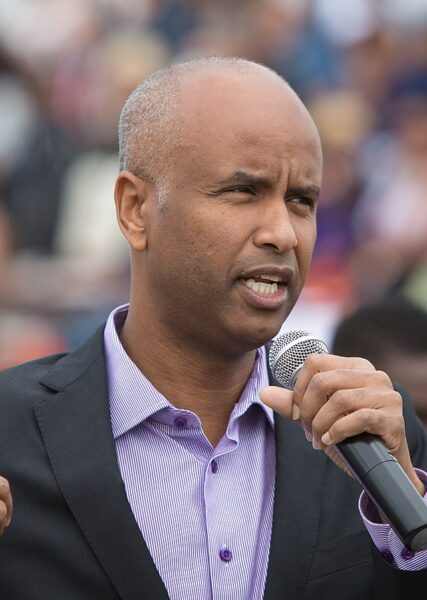
Immigration minister Ahmed Hussen at the Toronto Caribbean Carnival in 2017.
Photo by Bruce Reeve via Wikimedia Commons.
We’ll circle back to some specifics in a minute, but I’m fascinated by the notion of “communications” embodied here. I have questions.
- Four, five and seven years after being elected, who still needs communications help? You tell your voters the world will end if they elect the other team. A reporter calls, you send them bullshit. This isn’t exactly tricky.
- In what sense is this “communications”? Look at what Munch More Media did when Global came calling. (1) They erased their website. (2) They scrubbed their IG. (3) They shut down their Twitter account, which Global says had a single follower. (4) They left their Instagram account, whose last post was from 2018, and their LinkedIn account, which lists four followers and names no employees, intact. This is not a company with a proud story to tell. There’s a term for a communications firm that uses no social media. It’s “A firm that had damned well better have a sister in the minister’s office.”
- Hussen’s office hopes you’ll believe that a cabinet minister’s constituency office and his ministerial office never talk, but they sure seem to have closely studied the example of Munch More Media when it comes to fielding reporters’ queries. “Hussen’s office — over multiple conversations this week — did not acknowledge any connection between the director of Munch More Media and one of his most senior advisers,” Global reports. Now that’s gold-star communicating.
- This approach to communications is having its desired effect. Quick: What on Earth is Ahmed Hussen the minister of? How about Mary Ng? Don’t worry, I’m stumped too. Can you quote anything either person has ever said about anything? Of course not. If Hussen — or, might as well shoot for the moon, Ng — resigned from cabinet today, a resolution I here heartily advocate, you’d have to spare some sympathy for the poor wire-service reporter who’d be expected to come up with some kind of ending for the sentence beginning, “The minister is best known for ____.”
- Hussen’s riding has been held by the Liberals (and one apostate Liberal, John Nunziata, after he left the caucus to sit as an Independent) since Hussen was three years old, except for four years after the 2011 election. It’s one of the most reliably Liberal ridings under the eye of God, except for four years after the 2011 election. The only communications material a Liberal in York South-Weston needs is a billboard saying, “Michael Ignatieff Is No Longer the Liberal Leader.”
Willie Sutton was once asked why he robbed banks. Because that’s where the money is, he said. Well, communications contracts are the new banks. There will always be money in communications contracts, and, gloriously, the simple answer — “Answer the question” — is never correct. The goal of communications is not to communicate. It’s to figure out how to communicate as little as possible.
July 27, 2022
Baghdad Biden speaks
Chris Bray recounts the story of a local government attempting and — for a while — succeeding with the Baghdad Bob blanket denial strategy:
In the Deep Blue suburban town where I live, our city government has been stumbling through a series of crises. For a couple of years, employees fled from City Hall like the building was on fire, and nowhere was the crisis more acute than in the finance department — where we had five directors in a little over two years, and lost most of the other staff, including one who sued the city over her departure. There was a year when we couldn’t pass a budget, because the budget proposal was such a shambles, and a discussion at a meeting of an advisory commission in which a commissioner asked one of the many finance directors if the numbers in the city’s bank accounts matched the numbers in the city ledger. (Try to guess the answer.)
Recently, an ad hoc committee of local citizens — all finance professionals — wrote a report on the period of crisis, and presented our city council with a recommendation that they hire someone to do a forensic audit of the city’s accounting during those years. The council scheduled the report as a “receive and file” item, placing it on a 28-item agenda as, you’ll never guess, item #28. Then, in a brief discussion that began after midnight, they said that the report was nonsense and hearsay. The end.
So, yes, there was no financial crisis in our city during the years when we had five finance directors, when “permanent” finance directors left after a few months, when we lost most of the finance department staff, when we couldn’t pass a budget, and when we had no idea how much money we were actually supposed to have in the bank. Our city council says so. “These are not the ‘droids you are looking for.”
Meanwhile, we’re not in a recession, or even facing the risk of a recession, because that’s not Joe Biden’s view, and because the technical definition of a recession is very complicated.
Also, the inflation of 2021 was transitory. Zipped right by! Also, Joe Biden has a plan to shut down the virus.
The war in Ukraine is SHUT UP SHUT UP SHUT UP, the economy is SHUT UP SHUT UP SHUT UP, the continuing Covid-19 “emergency” is SHUT UP SHUT UP SHUT UP, and the mRNA injections are REALLY REALLY SHUT UP. Actually, the way experts measure this is really complicated, and technically …



